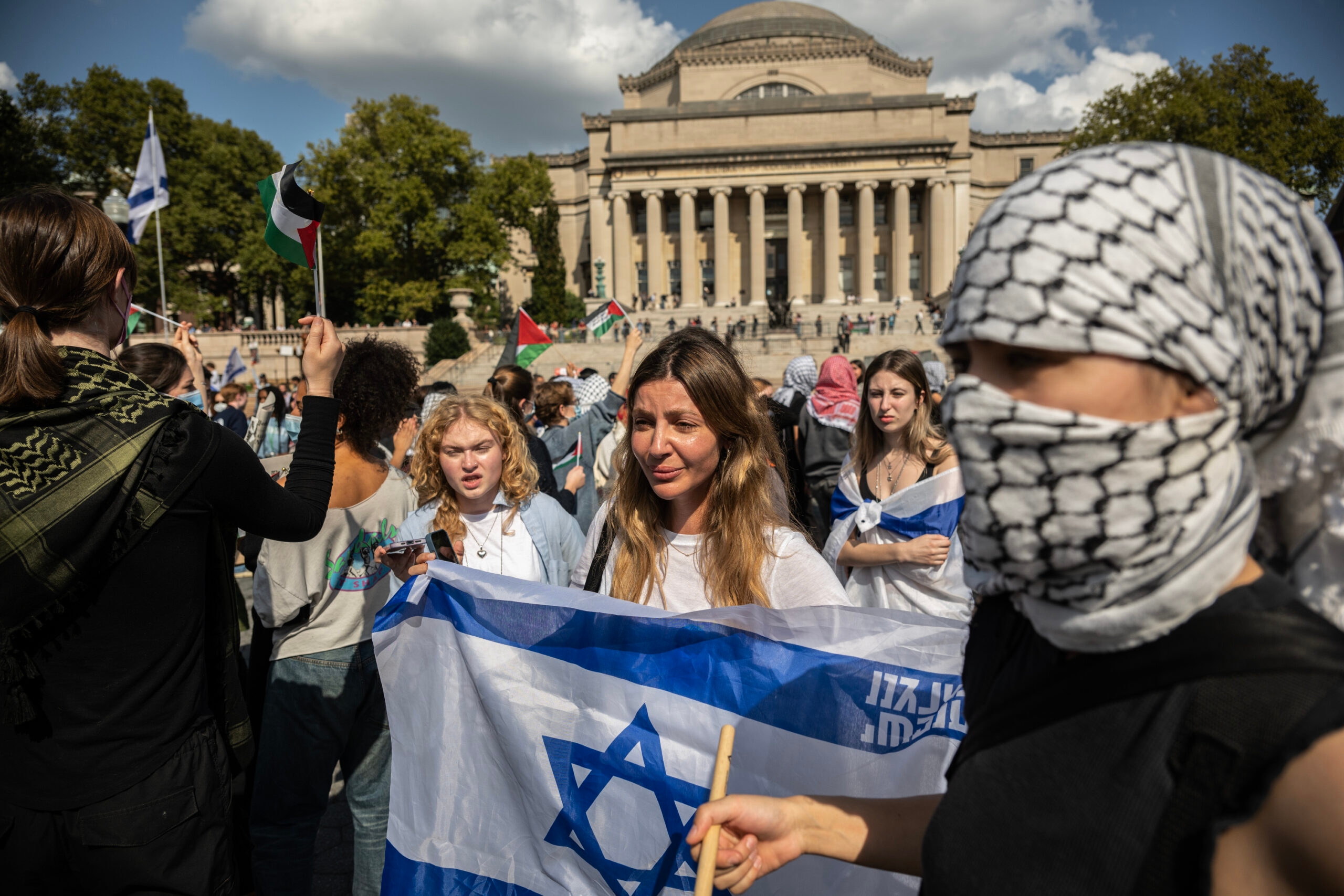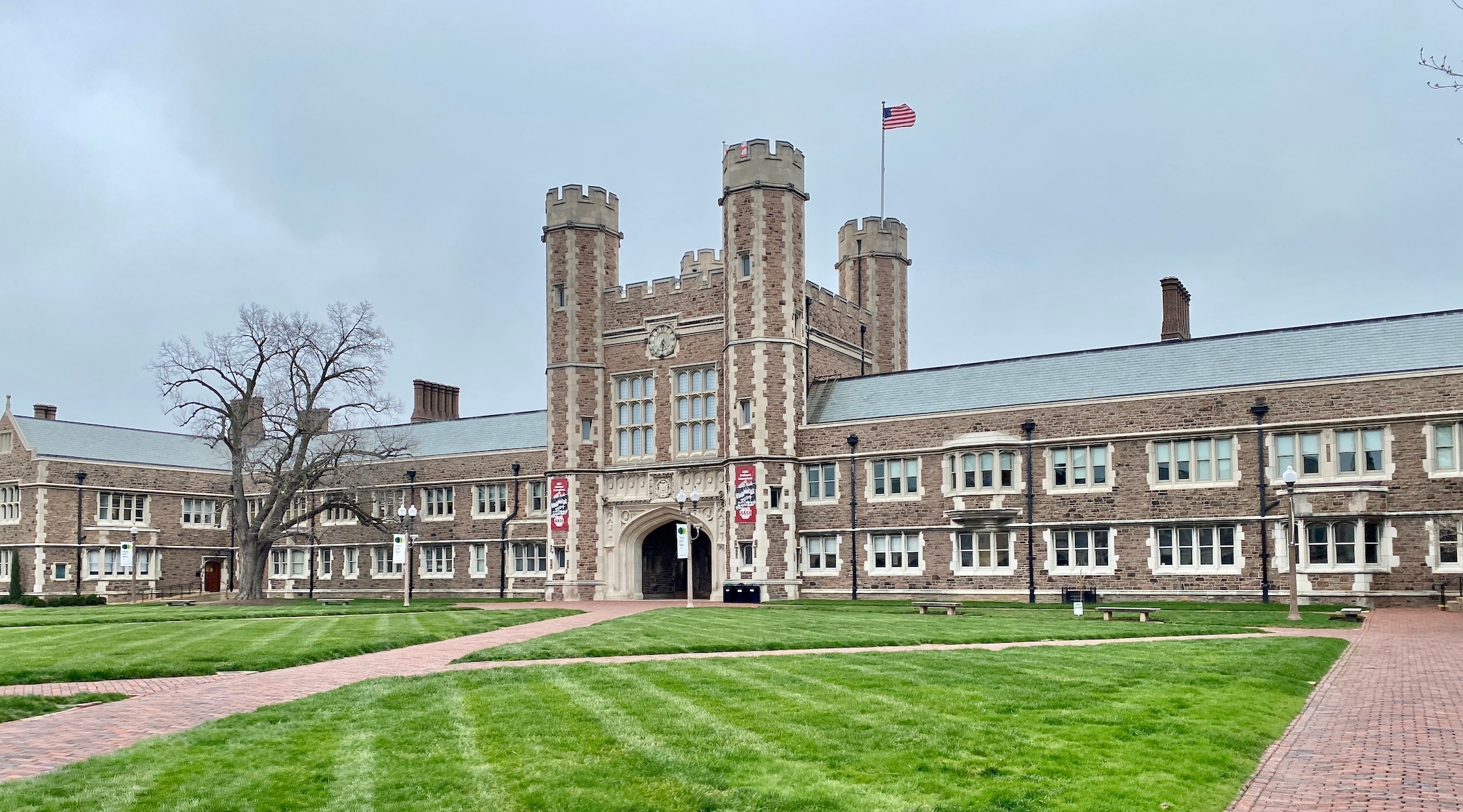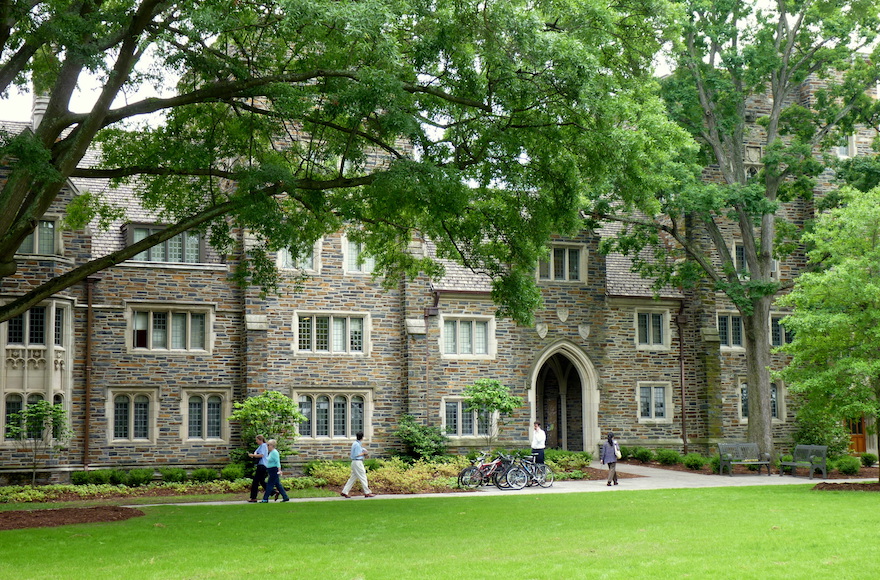This article was produced as part of the New York Jewish Week’s Teen Journalism Fellowship, a program that works with Jewish teens around New York City to report on issues that affect their lives.
Since she was little, Lindsay, who recently graduated from a Jewish day school in New York City, had her heart set on attending Columbia University.
And so, throughout her high school career, Lindsay focused on crafting an Ivy League school-approved resume. As a freshman, she spent hours in the library, studying hard to ensure good grades. When she was a sophomore, she joined clubs and gained leadership roles both in and out of school.
But as she completed her junior year in the aftermath of Hamas’ invasion of Israel on Oct. 7, 2023, when it became time to develop her college list, Lindsay realized she no longer felt the same way about Columbia. That’s largely because almost immediately after Oct. 7, students on campus began to protest Israel’s invasion of Gaza as well as the university’s investments in companies tied to Israel.
The elite uptown university quickly became ground zero for the campus pro-Palestinian campus movement, which left many Jewish students feeling scared or alienated from their peers. A study released last month by the Columbia University Task Force on Antisemitism found that more than half of Jewish students on campus — 53% — said they experienced discrimination over their religious identity in the 2023-2024 school year.
Watching what happened from afar caused Lindsay to change her mind about Columbia. “Feeling safe in my Jewish identity became a priority in my college search,” said Lindsay, who did not feel comfortable sharing her last name while criticizing colleges in the current political environment. “I can’t ignore Jewish hatred on campus. I’ll be there soon.”
She added: “I had lost respect for Ivies such as Columbia and Harvard. These schools fell further and further down my list.”
Ultimately, last fall, Lindsay decided not to apply Early Decision to Columbia. Instead, she applied Early Decision to Washington University in St. Louis. Lindsay was accepted and she’ll begin her studies there this fall.

Students protest against the war in Gaza and in support of Israel on the anniversary of the Hamas attack on Israel at Columbia University in New York, New York, on Monday, October 7, 2024. (Victor J. Blue for The Washington Post via Getty Images)
Lindsay is hardly alone among Jewish students who, for safety and comfort reasons, are seeking colleges outside of the traditional elite schools in the Northeast. Nearly half of the top 25 schools in the country are in the Northeast, according to a 2019 Forbes evaluation of America’s top colleges. And while schools like Columbia, Wellesley, and Harvard might have been many Jewish high schoolers’ one time “dream schools,” that changed following the campus protests and allegations that harassment and antisemitism were not being addressed by administrators. As a result, some Jewish teens began seeking alternatives in the Midwest and the South.
Take Evan Glasberg, an alumnus of the Ramaz School, a Modern Orthodox day school on the Upper East Side, who just completed his freshman year at Duke University. “I got into Columbia and was highly considering it,” Glasberg said, adding that both his brother and father attended the Ivy League school.
After speaking with some of his brother’s friends, who said they were deeply affected by the protests on campus — including some who questioned whether or not they should withhold their recognizably Jewish name — Glasberg said his decision was clear.
“These were things nobody should even have to consider, let alone follow through on,” Glasberg said.
Picking up on such concerns from prospective Jewish college students, the Anti-Defamation League developed a grading system to reflect incidences of antisemitism on 135 college campuses across the country. Using survey data from students and school administrators — responders were asked about a university’s policies and procedures, Jewish life on campus, and the prevalence of anti-Zionist incidents — the ADL assigned letter grades to public and private institutions throughout the country.
Although the grading system was controversial — with critics saying it painted campuses with too broad a brush – students nevertheless consulted it during their search.
Duke University, for example, received a B grade from ADL in both 2024 and 2025. Glasberg said that, in the spring of 2024, when he was deciding which school to attend, Duke had no reports of antisemitic incidents or any hostile anti-Zionist student government activity.
“After my first year at Duke, I’ve felt extremely validated in my decision,” Glasberg said. “I rarely have to think about antisemitism, and I’m so grateful for that.”
One college adviser who works at a Modern Orthodox school in the Bronx said that many of her students who would normally apply to Brown, Columbia or Barnard universities are now looking outside of the Northeast entirely. The adviser, who agreed to share information about her school’s applications data as long as she and the school went unnamed, said that the University of Florida and Washington University in St. Louis are two schools that are currently attracting former Ivy League-bound students.
“Before Oct. 7, 2023, safety was not often a concern in students’ minds,” said the adviser. “However, especially for the class of 2026, their lists are widening to include schools they may not have considered prior to Oct. 7.”
Both Harvard and Columbia have had to settle Title VI lawsuits accusing the university of failing to protect Jewish students from antisemitic harassment. The Trump administration has also canceled federal funding at Harvard, saying it was intended in part to curb campus antisemitism.
Harvard experienced 17% fewer applicants overall in the Class of 2028’s Early Action round (these students applied in the fall of 2023 after the events of October 7). In general, students across the Northeast have begun to shift away from Northern schools and look towards the South. In addition to antisemitism concerns, the ease of the Common App, cheaper costs to attend, warmer weather, and more opportunities in growing metro areas have all influenced Northeast students’ college choices.
This past fall, Wake Forest University in Winston-Salem, North Carolina — which has a B grade from ADL — had an incoming class of 340 Jewish students, an increase of 13% from the previous year, according to the school’s press office.
Ben Kudelka, a junior at Elon University in North Carolina, is elated with his decision to eschew a school in the Northeast. Kudelka, who is an alum of The Churchill School in Kips Bay, says he feels safe at the school.
Elon, Kudelka pointed out, received antisemitism training from Hillel to help create a positive campus climate for Jewish students.
“Not only does Hillel take constructive measures against antisemitism, but they also foster a deep community,” Kudelka said. “Each Friday night, Chabad is filled to the brim with students, both Jewish and not, wanting to come together and celebrate Shabbat.”

Brookings Hall at Washington University in St. Louis, Missouri, March 23, 2023. (Warren LeMay via Creative Commons)
Specifically though, one of Kudelka’s favorite parts of practicing Judaism in the South is the ability to hold Shabbat services and celebrate major holidays such as Yom Kippur, Rosh Hashanna and Passover outdoors.
“I always feel when I’m outside I’m closer, more connected to God than indoors,” he said. “It’s easier to get to the sky.”
Elon received an A from the ADL’s report card. Washington University in St. Louis earned a B, or “Better Than Most.” Harvard made its way to a C in 2025, up from an F in 2024. Columbia received a D both years.
When Milan Kushner applied to University of Miami during the 2023-2024 admission cycle, it had earned a B from the ADL. This past school year, it moved up to an A.
Kushner, who just completed his freshman year after graduating from Ramaz in 2024, said U of Miami was always on his radar, and the school’s lack of severe antisemitic and anti-Zionist incidents helped him feel confident about his decision to enroll there.
He’s not alone: In each of the Ramaz graduating classes of 2021, 2022 and 2023, two students enrolled at the University of Miami. However, in the class of 2024, Kushner is one of four Ramaz alumni enrolled. As for the class of 2025, five Ramaz alumni will be attending this fall, according to Kushner.
“The NYC Jewish population at UMiami is definitely growing,” said Kushner.
Out of the 10 schools that received an A this year on the ADL’s report card, five are in the South. One is in the Southwest, one is in the Midwest, and three are in the Northeast (Queens College, Brooklyn College and Brandeis University).
Washington University, where Lindsay will soon attend, received a B. At a recent dinner on campus hosted by Chabad for prospective students, she said she felt very comfortable at the event, which drew a mix of Jews and non-Jews.
The experience made an impact on her. “It replaced Columbia as my dream school,” she said.
The New York Jewish Week brings you the stories behind the headlines, keeping you connected to Jewish life in New York. Help sustain the reporting you trust by donating today.





